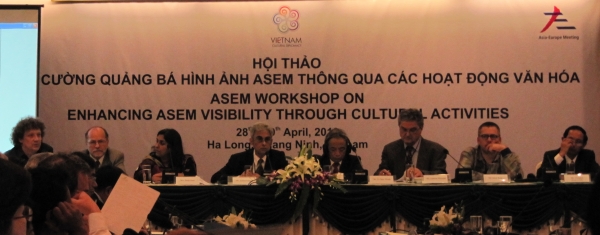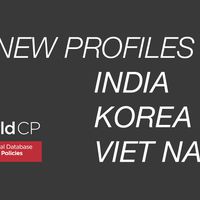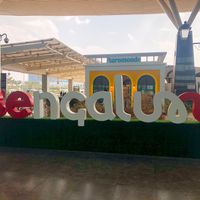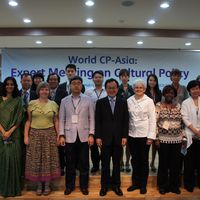Vietnam | An introduction to national cultural policy
By Bui Hoai SonVietnam is among the first Asian countries whose cultural policy profile has been commissioned for the global cultural research platform, WorldCP-International Database of Cultural Policies (worldcp.org). In this article, Bui Hoai Son, who is also the author of the upcoming cultural policy profile of Vietnam, sets out the key priorities and issues in arts and culture in his country.
In Vietnam, the term “culture” is understood in a very broad sense and with different meanings that relate to all aspects of the material and mental life of human beings.
-------------------------------------
-------------------------------------
Culture understood variously in society
[caption id="attachment_20922" align="aligncenter" width="600" caption="Vietnam keen to play active role in international cultural co-operation"]
 [/caption]
[/caption]The Vietnamese see culture as something broad about human life and civilization. Thus, the Vietnamese usually use “culture” in phrases such as “cultural person” (meaning “a civilized person”) and “cultural level” (referring to their education level).
In daily life, culture is understood as literature and the arts, such as poetry, fine arts, theatre, films etc.
In some Vietnamese dictionaries, “culture” is explained as follows:
+ Culture refers to the material and mental values that were created by humans in history (Great Vietnamese Dictionary, published by the Ministry of Education and Training, 1998)
+ Culture refers to human activities that satisfy the needs of mental life
+ Culture is scientific knowledge
+ Culture refers to a high level in social life, an expression of civilization
+ Culture is a term to refer to a period of ancient history, for example Hoa Binh culture, Dong Son culture (Vietnamese Dictionary, Institute of Linguistic Studies, 2004)
One of the most common definitions of culture is the way it was understood by the late President Ho Chi Minh: “…human created and invented language, script, morals, laws, science, religions, culture and arts and daily tools for clothing, eating, accommodation…using methods. All these creativenesses and inventions are culture.”
A national definition of culture?
Vietnam has no proper national definition of culture. However, in a broad sense, culture is seen to be included in eight domains namely ideology, morals and ways of life; heritage; education and training; science and technology; culture and arts; mass media; international exchange on culture; and, cultural institutions.
In a narrow sense, culture is seen to refer to some domains that belong to the sphere of state management under the Ministry of Culture, Sports and Tourism such as performing arts; cinema; fine arts and photography; library; heritage; grassroots culture; and, ethnic culture.
Key national priorities in arts and culture
The Vietnamese government has the following key national priorities in arts and culture:
- Building healthy people, ways of life, cultural life and environment
- Safeguarding and promoting national cultural heritage
- Safeguarding and promoting cultural heritage of ethnic minority groups
- Developing the work of literature and arts
- Paying respect and promoting the good cultural and moral values of religions and beliefs
- Strengthening the work of mass media
- Intensifying international cooperation in culture
- Building a system of cultural institutions
Key cultural policies
The Vietnamese government has put forward some national policies for arts and culture. They are currently making and amending laws related to cultural heritage, cinema, libraries, education, publishing and copyrights. There is also a focus on building social movements such as “building cultural life” and “building new rural areas”.
The government is setting up policies on privatization and decentralization of cultural activities and for strengthening the management of cultural activities and services. Investment in traditional art forms is encouraged, National target programmes are in place for conservation of heritage buildings and sites as well as the preservation and promotion of the intangible heritage of Vietnam’s ethnic groups. Strengthening investment in and development of cultural institutions in mountainous, remote, borderline and island areas is a priority area. Strengthening the capacities of grassroot cultural workers is also being stressed in policy. Cinema development has also been accorded priority.
Public funding for the arts
In Vietnam, all public institutions for arts and culture are supported by the government. In principle, the government has funding policies for arts institutions in accordance with an Inter-Ministerial Circular between Ministry of Culture and Ministry of Finance in 1989, as per which the government will support art institutions with a minimum standard investment for their activities (including salary and expenses to set up performances ordered by the government). To get the support of the government, arts institutions have to meet with some set requirements.
Role of civil society actors in arts and culture
Civil society actors have an active role in the field of arts and culture. They respond to society’s needs and demands in arts and culture. They reflect the voices of people in their forums to government institutions in culture and the arts, so that these institutions will implement proper policies and mechanisms that reflect reality. Civil society actors build partnerships with similar organisations in other countries, leading to better international understanding of and cooperation with Vietnam. They also support their members by providing information, knowledge and skills to improve activities in the field of arts and culture.
International cultural co-operation priorities
Vietnam is actively involved in some regional forums and enjoys good relations in the field of culture and the arts with UNESCO, the Asia-Europe Meeting (ASEM), ASEAN Committee on Culture and Information (ASEAN COCI), SEAMEO SPAFA Regional Centre for Archaeology and Fine Arts, World Intellectual Property Organization and ICCROM (International Centre for the Study of the Preservation and Restoration of Cultural Property).
Key countries with which Vietnam enjoys good relations in the field of cultural exchange and co-operation include members of the south-east Asian ASEAN community, Australia, Belgium, China, Denmark, Finland, France, Germany, Japan, Netherlands, Russia, South Korea, Sweden, the United States and the United Kingdom.
Current cultural policy issues and challenges
Firstly, the culture sector is a multi-domain sector; hence, existing cultural policies cannot cover all aspects of activities that are in this sphere. Secondly, the quality of cultural managers and workers do not meet the demands of ground reality, in terms of both numbers and quality. Thirdly, the system relevant to culture and the arts, though improving with time, still requires to be worked on in terms of amending and improving laws and regulations. Fourthly, the budget for culture and the arts are limited. Fifthly, the differing viewpoints of cultural managers and those making cultural policies affect the result and quality of the policy. Sixthly, rapid changes in ground realities in the field of arts and culture create obstacles in the path of effective cultural planning and policy making.
Bui Hoai Son, PhD, is the Vice Director of the Vietnam Institute of Culture and Arts Studies, based in Hanoi. He is currently working on the cultural policy profile of Vietnam for inclusion in the global cultural research platform, WorldCP-International Database of Cultural Policies (worldcp.org). WorldCP is an international database and searchable website of country-specific profiles of arts and cultural policies, issues and trends supported by the Asia-Europe Foundation.
To read more about arts and culture in Vietnam, visit https://culture360.asef.org/country/vietnam/
To read more about the WorldCP-International Database of Cultural Policies, visit http://tiny.cc/282jbw
Similar content
12 Dec 2011
29 Mar 2012
posted on
06 Jan 2014
posted on
23 Mar 2012
24 May 2019
from - to
27 Jul 2011 - 28 Jul 2011






